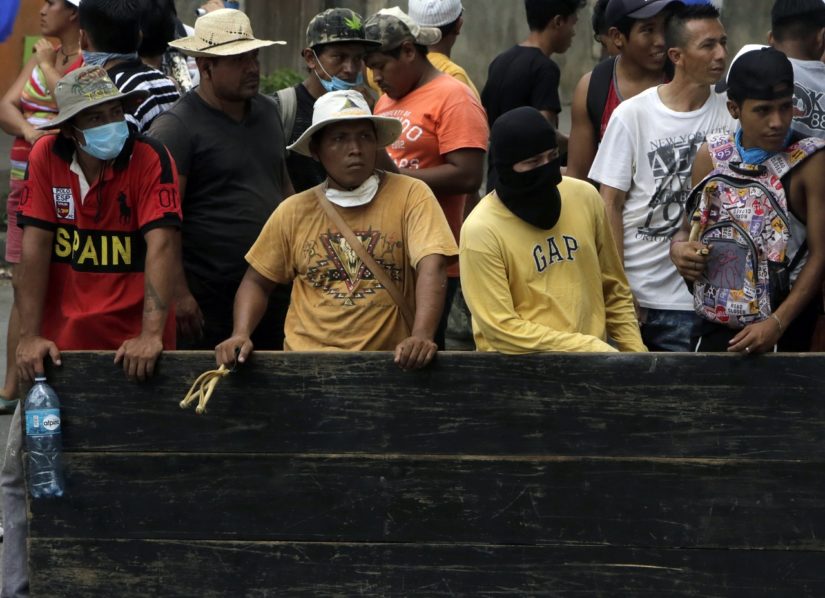
Nicaragua’s government urged its opponents Monday to return to the negotiating table, after a night of clashes between police and protesters left five more people dead in the country’s escalating crisis.
Residents described scenes of terror overnight in the flashpoint city of Masaya, which saw running battles all weekend pitting residents armed with home-made mortars and slingshots against what they said were paramilitary forces and riot police loyal to President Daniel Ortega.
More than 100 people have died in the violence sweeping Nicaragua since protests erupted on April 18 against Ortega, the man who has dominated the Central American country’s politics for four decades.
The Catholic Church initially tried to mediate the conflict, but called off the talks after a crackdown on a march led by victims’ mothers on Wednesday left another 16 people dead.
Ortega’s wife and vice president, Rosario Murillo — a figure widely reviled by the protesters — made an appeal to return to dialogue.
“We all want peace, we want dialogue, we want to work together and listen to each other, discuss all issues, because there’s a solution for everything,” she told state media.
“Let’s not keep suffering losses, pain, mourning in our families.”
The Church has said talks are impossible as long as “the people continue to be repressed and killed” by “groups close to the government.”
‘Practically an invasion’
The latest victims in Masaya were killed between Sunday night and Monday morning, according to Alvaro Leiva, head of the Nicaraguan Association for the Protection of Human Rights (ANPDH).
The agency has identified just one of them so far, a 23-year-old teacher named Carlos Lopez, who was killed by a bullet in the torso — indicating “he was executed, no doubt, by snipers.”
“There is a profound violation of human rights” in Masaya, said Leiva.
Catholic priest Augusto Gutierrez, whose parish is in the city’s Monimbo neighborhood, said the security forces had launched a “generalized attack.”
“It was practically an invasion of the city with heavy armaments. There were bursts of (automatic weapons) fire,” he told AFP.
Gutierrez said the attackers were riot police and plainclothes groups who entered the city in pick-up trucks, their guns blazing.
Multiple witnesses told him stories of summary executions by the police.
One young man of 15 “begged for his life,” but was shot dead anyway, the priest said.
Under siege
Residents in Masaya have constructed barricades with cobblestones, furniture, sheet metal and virtually anything else available to try to keep out Ortega’s security forces, which they accuse of pillaging the city of 100,000 people.
The government blames criminals for the pillaging, and says it sent in riot police at the request of small-business owners.
Protesters have captured a number of police officers during the clashes, while police have arrested several demonstrators, many of whom say they have been badly beaten while in custody.
At least 113 people have been killed in the nearly eight weeks of violence, according to another rights group, the Nicaraguan Center for Human Rights (CENIDH) — though it had not yet confirmed the latest deaths reported in Masaya.
The city’s police chief Ramon Avellan meanwhile reported the death of a 22-year-old police officer, allegedly killed when demonstrators attacked a Masaya police station.
It was unclear whether that death was included in the toll given by the ANPDH.
Virtual curfew
In Managua, there is a virtual curfew in place after dark, with motorcycle gangs terrorizing those who venture out, according to the CENIDH.
The wave of protests against Ortega and his ruling party — the Sandinista National Liberation Front — erupted on April 18 and quickly turned violent.
The brutal crackdown on what started as relatively small protests against pension cuts have fueled demands for the ouster of Ortega and Murillo.
Ortega, whose third consecutive term is due to end in 2022, accuses right-wing opposition groups of conspiring to “terrorize” the country.
[ad unit=2]



